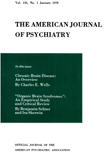Heroin Use as an Attempt To Cope: Clinical Observations
Abstract
The authors suggest that addicts' use of opiates represents a unique and characteristic way of dealing with ordinary human problems and the real world around them. Through five case reports they illustrate how addicts resort to drugs because they have failed to develop symptomatic, characterologic, or other adaptive solutions to stress. In addition, they describe how the pseudoculture of the addict also plays a part infilling his social vacuum and providing an alternative to the establishment of meaningful attachments to other people. The implications for treatment are considered.
Access content
To read the fulltext, please use one of the options below to sign in or purchase access.- Personal login
- Institutional Login
- Sign in via OpenAthens
- Register for access
-
Please login/register if you wish to pair your device and check access availability.
Not a subscriber?
PsychiatryOnline subscription options offer access to the DSM-5 library, books, journals, CME, and patient resources. This all-in-one virtual library provides psychiatrists and mental health professionals with key resources for diagnosis, treatment, research, and professional development.
Need more help? PsychiatryOnline Customer Service may be reached by emailing [email protected] or by calling 800-368-5777 (in the U.S.) or 703-907-7322 (outside the U.S.).



